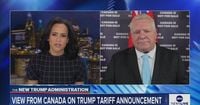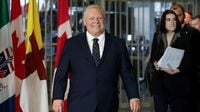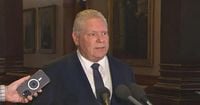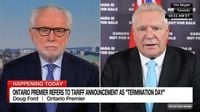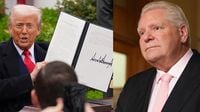Ontario Premier Doug Ford expressed cautious optimism on April 2, 2025, following U.S. President Donald Trump's announcement of new tariffs, which will impose a minimum baseline rate of 10 percent and a 25 percent tariff on foreign-made vehicles. Ford emphasized the positive aspect that Canada and Mexico were excluded from the list of countries facing these tariffs, stating, "The positive thing that I saw was we weren't on that list," during a press conference at Queen's Park.
Ford’s comments came after Trump unveiled a lengthy list detailing the tariff levels that other countries would face starting on April 3, 2025. "We weren't on page one, we weren't on page two, we weren't on page three, ourselves and Mexico. We're going to stay tuned," Ford added, highlighting the importance of the relationship between Canada and the U.S.
He noted that the relationships built between Canadian and American officials have played a critical role in this outcome. "This all goes back to relationships. And I've always believed in that, in business and government, you have to build a relationship. I believe we have built it," he said.
In a broader context, Ford warned of the negative impacts tariffs could have on both sides of the border, dubbing the day of the announcement as "Termination Day," due to the potential job losses that could ensue from such trade barriers. "You can't just all of a sudden put tariffs on every part and every widget that comes across the border," he remarked in an interview with CNBC. He also criticized Trump's belief that these tariffs would create jobs and reduce inflation, suggesting instead that they would have the opposite effect.
Ford's sentiments were echoed by Canadian Prime Minister Mark Carney, who stated that the government would respond to Trump's tariffs with countermeasures and support for affected workers. "We are going to fight these tariffs with countermeasures. We are going to protect our workers," Carney asserted, although he did not provide specific details on what those measures would entail.
Toronto Mayor Olivia Chow also weighed in on the matter, noting that Toronto conducts $123 billion in trade with the U.S. annually. She expressed concern over the trade war's potential impact, stating, "Unfortunately, President Trump's trade war is putting it all at risk. People on both sides of the border … are feeling anxious — they're worried about their jobs and the impact this trade war will have on their cost of groceries, gas, homes, cars, and it really doesn't have to be that way." Chow called on Trump to end the threats, emphasizing the need for cooperation.
In light of the tariffs, Ford reiterated his commitment to fostering a strong trade relationship between Canada and the U.S. He stated, "I just want to build a strong Am-Can fortress, American-Canadian fortress, the strongest countries in the world, the safest countries, the most prosperous. That’s what we would like to see and continue on our incredible relationship of over 200 years." He also expressed gratitude that Canada had been spared from the tariffs, saying he was "very, very grateful" for the exemption.
Ford's optimism was tempered by the acknowledgment of the economic uncertainty that such tariffs can induce, affecting both Canadian and American citizens. He mentioned that while Canadians are "ready to sacrifice" in the face of the escalating trade war, many Americans may not yet feel the full impact of these tariffs.
Despite the positive news regarding Canada’s exemption, there remains a looming concern over the potential repercussions for workers in the auto and steel industries. Ontario Opposition Leader Marit Stiles warned that many Canadians could face "fresh new uncertainties" as a result of the tariffs, calling for smart strategies to support workers and families.
In response to the potential economic fallout, Ford indicated that Canada could drop its tariffs on U.S. goods if Trump were to cease the trade war. "We’d be willing to take those off tomorrow, if he took all the tariffs off. We are not the problem," he stated, emphasizing the interconnectedness of the economies.
As Canada prepares for the tariffs' implementation, discussions among political leaders continue. Ford, who is the chair of Canada’s Council of the Federation, is set to meet with Prime Minister Carney and other premiers to strategize on the best approach moving forward.
In summary, while Ontario Premier Doug Ford expressed relief that Canada has avoided new tariffs, he cautioned against the broader implications of the trade war initiated by President Trump. The situation remains fluid, with ongoing discussions about how best to protect Canadian workers and maintain strong economic ties with the United States.
